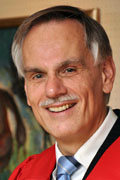 |
| Prof. Peter Lampe. |
|
Prof. Peter Lampe recently delivered his inaugural lecture as an Honorary Professor in the Department of New Testament in the Faculty of Theology of the University of the Free State (UFS).
The title of Prof. Lampe’s inaugural lecture was Theology and rhetorics: how do "res" and "verba" relate to each other, in which he addressed the fundamental question of the role and importance of words and the issue/content in theology. Can content simply be conveyed in any manner? Also in theology, Martin Luther observed that some theologians’ works contain words (verba) and those of others the content (res). In his inaugural lecture, Prof. Lampe pointed out that our knowledge of God/reality specifically has to be construed through the use of words. Words and terminology therefore have to be selected with circumspection. Res and verba stand in close relation to each other.
Prof. Lampe declared that in the post-modern world, a “competition” exists for the best constructed worldview and theologians could make a significant contribution to the construction of a better reality through better judgement of the words they use.
Prof. Lampe, currently the Chair of New Testament Theology at the University of Heidelberg in Germany, has a rich and varied history in the field of theology. Having attained degrees in theology, philosophy and archaeology in Gottingen, Rome and Berne, Prof. Lampe has enjoyed an illustrious professional career. After receiving his Ph.D. at the University of Berne and teaching New Testament Studies there, Prof. Lampe held the Chairs of New Testament Studies in Virginia (USA) and History and Archaeology of Early Christians in Kiel (Germany), before being appointed to the post he currently holds.
In 2003 he was awarded the German Ecumenical Preaching Award and in Turkey he was the leader of an expedition that discovered the long-lost Montanist headquarters of Pepouza and Tymion.